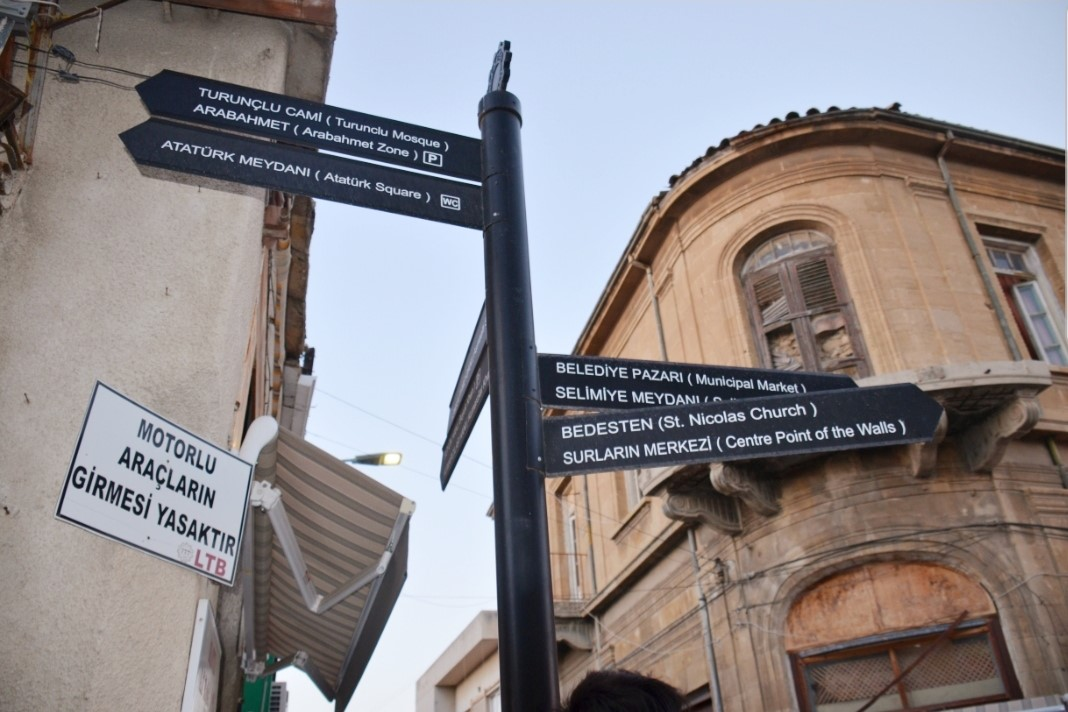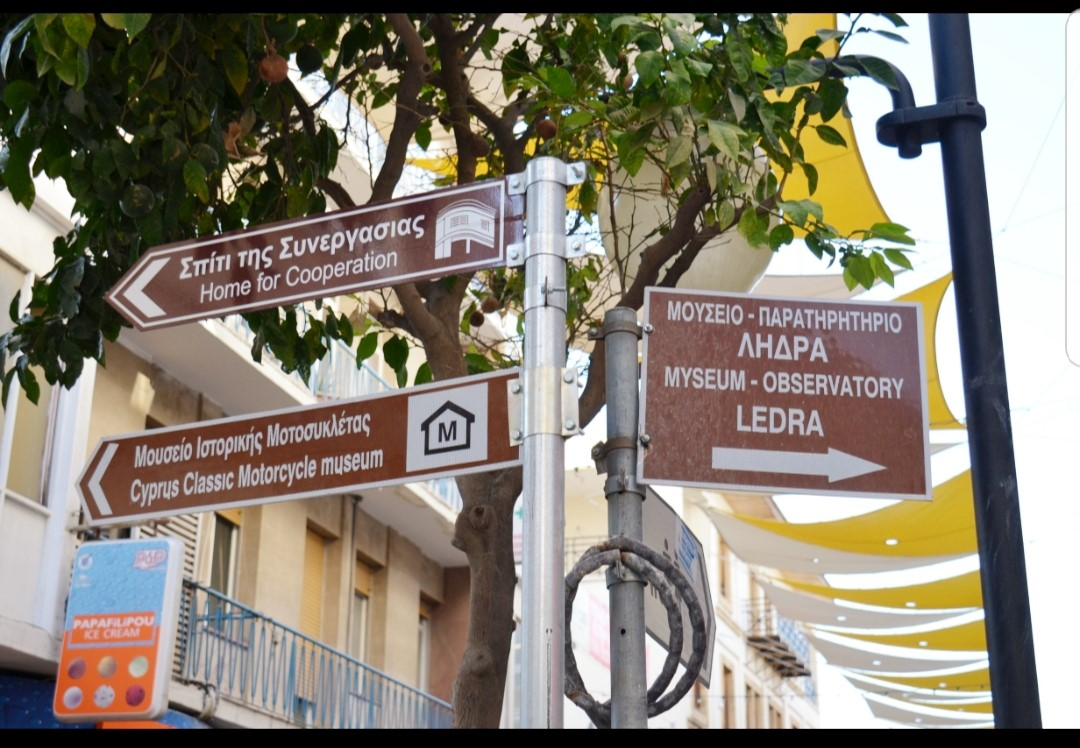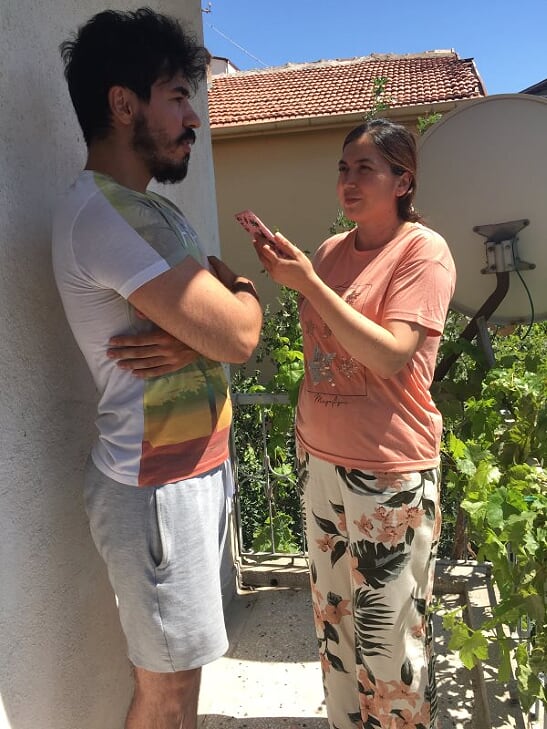
By Professor Jeanine Treffers-Daller,* CBRL Pilot Study recipient and professor at the University of Reading.
Cyprus is one of the most interesting places in Europe to study multilingualism and identity as the island is divided into the northen Turkish-speaking part and a southern Greek-speaking part. For both communities, language is key to their ethnic identity, though the issue is rather complex. Which languages are we talking about? The inhabitants from both parts of the island are highly multilingual: they speak Cypriot Greek or Cypriot Turkish as well as the standard varieties of Greek or Turkish. And then there is English, which is used as a lingua franca in administration, tourism, banking and healthcare. English is therefore an integral part of the daily lives of many Cypriots and very present in the linguistic landscape. It is probably fair to say that multilinguals have different identities at the same time, as can clearly be seen in Cyprus.

Cypriots from both language communities identify with Cyprus, but at the same time they have links with Greece or Turkey, and they may feel they are European too. These different identities are reflected in the language choices they make every day. Turkish Cypriots may use the local dialect when talking to friends on Bandabulya municipal market, but switch to standard Turkish when speaking to a customer from the Turkish mainland. They can also quickly switch to English when tourists need to be shown how to get to the beach. The same is true for Greek Cypriots, who switch equally easily between languages whenever the situation requires it [1]. For example, Natasa, a Greek-English bilingual, switches from Greek to English between two sentences in a conversation with Valentina, the Cypriot Greek researcher on the team:
An de ixéris Angliká ti símeron iméra, í ésto mian álli glóssa, en páis poúpote. That’s the way it is eftikhós í distikhós
“Nowadays, if you don’t know English, or at least any other language, you don’t get much ahead in your life. That’s the way it is, for better or for worse.”
Speakers from both communities can take switching one step further by mixing languages even within a sentence. This is what Zehra, the bilingual Turkish-English researcher on the project, found out when she asked Hatice about the beautiful necklace she was wearing. Explaining who gave the necklace to her, Hatice said:
Boynumdaki necklace is golden, annemden gift
“The necklace around my neck is a gift from my mum.”
The key question for our project is how the different sociocultural identities map on to linguistic expressions of these identities. Recent work on identity in multilinguals [2] suggests that some people tend to blend different elements from each culture (the hybrid identity style) while others try to keep both identities separate and alternate between them (the alternating identity style).

We are interested in finding out to what extent these different identity styles are found in Cyprus, and how these identity styles are reflected in the ways in which speakers switch between languages and varieties of language. Are Cypriots who like blending elements from different cultures also more likely to produce hybrid sentences such as the one produced by Hatice? Or are those who identify more with Cyprus likely to use more English words than those who identify more closely with the Greek or Turkish mainland? Or could it be that UK-born Cypriots are more likely to display hybrid identities while those who were born in Cyprus adopt alternating identity styles?
The participants in the study were 80 Cypriot multilinguals (40 on each side of the boundary). Half of these were born in Cyprus and the other half in the UK. They filled in questionnaires which tapped into their sociocultural identities and language learning history. They also listened to hybrid sentences containing Greek and English words or Turkish and English words and were asked to evaluate to what extent these sounded like sentences they heard in their environment. We look forward to being able to report soon on the findings of this exciting project.
*Additional team members of the MiNC project: Çise Çavuşoğlu, Valentina Christodoulou, Theodosia Demetriou, Zehra Ongün and Christiana Themistocleous.
References:
[1] Sophocleous, A. & Themistocleous, C. (2014). Projecting social and discursive identities through code-switching on Facebook: the case of Greek Cypriots. Language@Internet, 11. article 5. ISSN 1860-2029.
[2] Ward, C. Ng Tseung-Wong, C., & Szabo, A. (2018) Hybrid and Alternating Identity Styles as Strategies for Managing Multicultural Identities. Journal of Cross-Cultural Psychology 49(9),1402–1439.
Jeanine Treffers-Daller is Professor of Multilingualism at the University of Reading, UK. She has published widely on code-switching, borrowing and other language contact phenomena in a range of language pairs. She is a member of the Editorial Board of the International Journal of Bilingualism and of Bilingualism, Language and Cognition.
The views expressed by our authors on the CBRL blog are not necessarily endorsed by CBRL, but are commneded as contributing to public debate.














